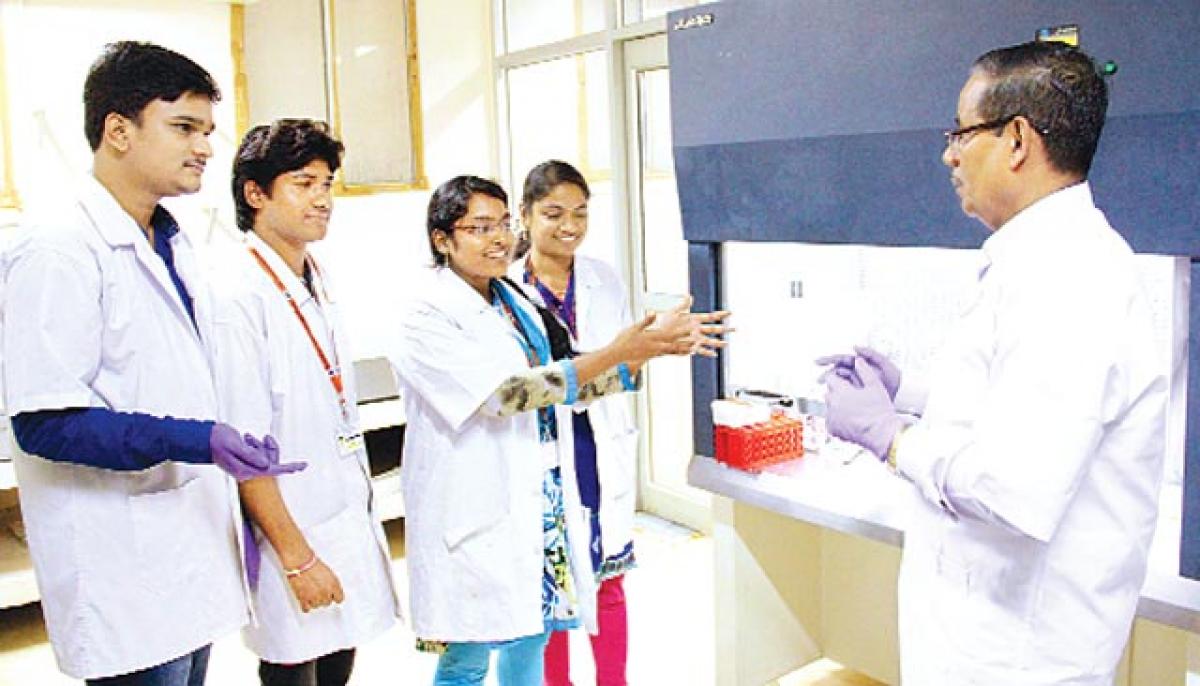Live
- Low Pressure Area Likely in Southeast Bay of Bengal, Heavy Rains Forecasted for AP
- Malabar Gold & Diamonds launches new gold jewellery
- Collector reviews arrangements for Guv’s visit
- 13 members of robbery gang arrested
- Country’s development depends on youth’s progress: Collector Vinod
- Exports picking up as mfg gains steam
- CM Revanth Reddy to Attend Commonwealth Mediation and Arbitration Conference Today
- Beware of new cyber scam ‘digital arrest’: SP Subba Rayudu
- Sensex, Nifty slip under pressure amid weak global cues
- Posters on novel solutions to problems at Tech Summit
Just In

A team of Indian scientists from the Indian Institute of Chemical Technology (IICT) claim an important breakthrough by finding a way to persuade the body’s immune system to attack tumours and eliminate side effects.
A patent has been filed in 2014 and negotiations with companies are on to take it to the human level. – Arabinda Chaudhuri, Chief Scientist, Biomaterials Group
A team of Indian scientists from the Indian Institute of Chemical Technology (IICT) claim an important breakthrough by finding a way to persuade the body’s immune system to attack tumours and eliminate side effects.
The Biomaterials Group of IICT has been working in design and development of nanoparticle-based drug delivery systems for targeted cancer therapy. Arabinda Chaudhuri, chief scientist, Biomaterials Group, IICT said, “Using a combination of targeted chemotherapy and direct in vivo targeting of DNA vaccines to dendritic cells has given positive results in eradicating established skin cancer, liver tumour and colon cancer in mice.”
Pre-clinical studies by the Group have been going on for years and the tests on mice were conducted between 2008 till date. Arabinda informed, “A patent has been filed in 2014 and negotiations with companies are on to take it to the human level.” Explaining the effectiveness of the dual method of attacking cancerous cells, the Chief Scientist said that it helps activate T-cells which in turn kill tumour cells.
While the method proved successful in eradicating tumour in skin cancer, liver tumour and colon cancer, enhancement of life or prolonging life in mice affected with brain tumour, pancreatic cancer and lung cancer was recorded. Untreated mice died in 30 days while the treated ones survived for a period of 110 days. There was no relapse of cancer for more than 200 days, which has prompted scientists to go in for a patent.
However, it may take several years before it is safe enough to be tested on humans. The CSIR-IICT has been collaborating with Mayo Clinic, USA and a Memorandum of Understanding (MoU) has been signed to this effect to start Phase 1 trials.
Cancer stem cells
Another breakthrough by the scientists has been in cancer stem cells. “Cancer stem cells are one in a billion, which are resistant to drugs. To make them respond to drugs by using a pathway glucocorticoid receptor to feed the cells against the drug to kill it, has been our endeavour,” said Raj Kumar Banerjee, principal scientist, Biomaterials Group.
The glucocorticoid receptor is a novel and unique target for drug resistant cancer stem cells and for treating aggressive tumors (of pancreas, skin, and lung). Research on combating neuro-generative diseases such as Alzheimer’s and heart diseases by nanoparticle-based drug delivery system for cancer therapy is undertaken in a big way. Chittranjan Patra, scientist, Biomaterials Group, IICT said, “Metal nanoparticles such as Zinc Oxide and biosynthesised gold nano particles are effective.”

© 2024 Hyderabad Media House Limited/The Hans India. All rights reserved. Powered by hocalwire.com







